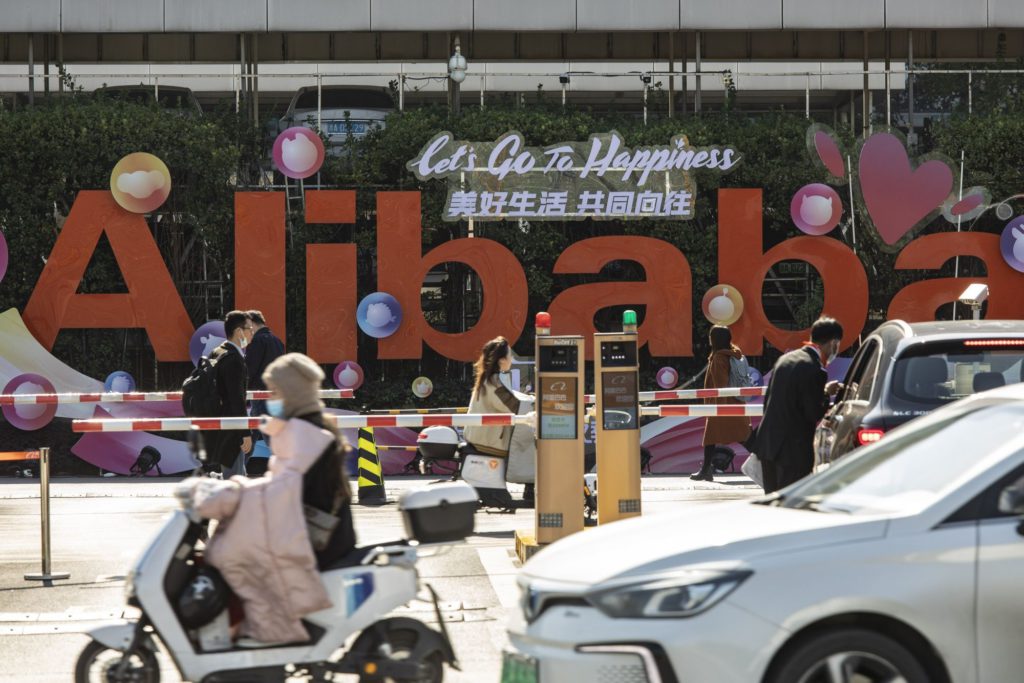(Bloomberg) — Alibaba Group Holding Ltd. soared after reporting revenue rose a better-than-expected 9%, reassuring investors trying to come to grips with the economic cost of sweeping lockdowns intended to eradicate Covid-19.
The shares rose more than 12% in Hong Kong after the company reported revenue climbed to 204.05 billion yuan ($30.3 billion) in the March quarter, beating analysts’ projections. On Thursday, Chief Executive Officer Daniel Zhang emphasized his company would pursue higher-quality expansion, keep a lid on costs and keep expanding its ability to build cloud and digital infrastructure for customers. SoftBank Group Corp., Alibaba’s biggest shareholder, gained 4.5% in Tokyo.
But China’s e-commerce leader also refrained from offering its usual revenue forecast for the year, underscoring the unpredictable impact of a Covid Zero policy that’s already cast the country’s supply chains into disarray and hammered consumer sentiment.
Alibaba — a barometer for Chinese consumer sentiment because of its dominance of Asia’s largest retail arena — is grappling with intensifying competition and mounting economic uncertainty at home. This week, Chinese Premier Li Keqiang warned of dire consequences if officials didn’t move decisively to safeguard the economy.
Alibaba will play its part in helping shore up the economy, Zhang told analysts on a post-earnings conference call. The company’s own revenues had slid by a single-digit percentage in April, though logistics were improving in areas such as hard-hit Shanghai as Covid cases came down.
“In the new fiscal year, we will focus even more on cost control and continue to improve our operating efficiency,” he said.
Click here for a live blog on the results.
What Bloomberg Intelligence Says
Alibaba’s stronger-than-expected fiscal-4Q commerce-revenue gain raises the likelihood of a speedy recovery of the internet giant’s retail and consumer units by the September quarter, assuming disruptions from Covid-19 on mainland China fade. April commerce revenue probably dropped by more than 7% from a year earlier as China gross merchandise volume declined 10% amid virus-led lockdowns. The company can stanch its slide if virus cases drop and cause restrictions to be lifted, spurring a rise in buying sentiment by fiscal 2Q.
– Catherine Lim, analyst
Click here for the research.
Once the most valuable company in China, Alibaba has seen its market value erode since Beijing launched its sweeping crackdown on the private sector more than a year ago. The government forced Alibaba’s finance affiliate, Ant Group Co., to call off what would have been the world’s largest initial public offering in 2020, and then launched reforms that have undercut Alibaba’s business model.
Chinese antitrust watchdogs have since chilled Alibaba’s expansion plans and helped JD.com Inc. overtake it on sales growth, while up-and-coming competitors from ByteDance Ltd. to Pinduoduo Inc. are drawing users from the traditional online-shopping leaders.
Beijing this year pledged to support the internet sector, designating the digital economy an important growth driver. Last week, rival Tencent Holdings Ltd. said it will take time for regulators to take action.
China’s two largest internet firms are responding in 2022 to a new era of sharply lower growth brought on by relentless Beijing scrutiny. Alibaba said in February it’ll focus on retaining users rather than pursuing the aggressive market-share grab of years past. That marked a major shift for a company that once fought rivals in arenas from media to the cloud and retailing, and follows more than a year of curbs on every facet of China’s internet sector.
Alibaba’s net loss widened in the March quarter to about 16.2 billion yuan, after the value of its investments fell. Its annual active users in China surpassed the 1 billion mark.
More recently, China’s commitment to Covid Zero has hit the world’s second-largest economy, with production and logistics suffering from stringent anti-virus measures. Companies are quarantining thousands of workers and having them sleep on factory floors, with operations being disrupted by repeated mass testings and movement restrictions. In a rare show of frustration, Tencent’s billionaire co-founder Pony Ma shared a viral opinion piece on the economic costs of China’s strict Covid Zero measures this week.
“The history of economic development has always been filled with twists and turns,” Zhang said. “In the long run, we strongly believe in the resilience and the potential of the Chinese economy.”
In a response to domestic hurdles, Alibaba has turned increasingly outward — Lazada, its Southeast Asian arm, Trendyol in Turkey and Daraz around South Asia have evolved into important units of the company. Alibaba has outlined a long-term goal of quintupling Lazada’s gross merchandise value, the sum of transactions across its platforms, to $100 billion.
More stories like this are available on bloomberg.com
©2022 Bloomberg L.P.











